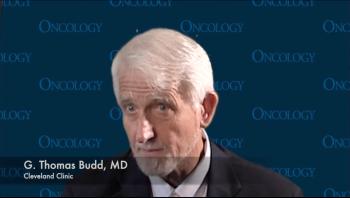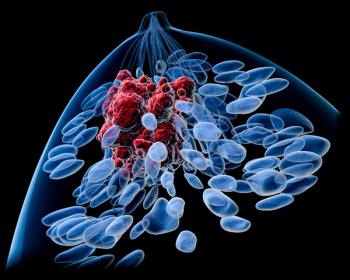
Treatment with zanubrutinib also appears to improve overall survival compared with ibrutinib among patients with relapsed/refractory chronic lymphocytic leukemia or small lymphocytic lymphoma in the phase 3 ALPINE trial.

Your AI-Trained Oncology Knowledge Connection!


Treatment with zanubrutinib also appears to improve overall survival compared with ibrutinib among patients with relapsed/refractory chronic lymphocytic leukemia or small lymphocytic lymphoma in the phase 3 ALPINE trial.

Treatment with venetoclax appears to be well-tolerated in patients with chronic lymphocytic leukemia or small lymphocytic lymphoma, says Nilanjan Ghosh, MD, PhD.

A 70% overall response rate was observed when bridging therapy was added to axi-cel for patients with relapsed/refractory large B-cell lymphoma.

Early phase data found that use of D8 Fab CAR results in increased responses and activity for patients with relapsed/refractory multiple myeloma.

The phase ZUMA-2 trial showed safe and efficacious responses for patients with relapsed/refractory mantle cell lymphoma treated with brexucabtagene autoleucel.

The assessment of health-related quality of life for patients with previously treated multiple myeloma was found to be enhanced in the phase 3 KarMMa-3 trial when patients were treated with idecabtagene vicleucel.

The use of teclistamab in the real-world phase 2 MajesTEC-1 analysis showed similar safety and efficacy for patients with relapsed/refractory multiple myeloma.

Results from the phase 1/2 SAVE trial demonstrated an improved objective response rate when revumenib was added to decitabine/cedazuridine, and venetoclax for patients with relapsed/refractory acute myeloid leukemia.

An AI algorithm was created to distinguish prefibrotic primary myelofibrosis and essential thrombocythemia from each other.

Patients with promyelocytic leukemia saw an improved overall survival and relapse-free survival when treated with an all-oral regimen of arsenic trioxide, all-trans retinoic acid, and ascorbic acid.

Ritu Salani, MD, suggests using the immune system to find treatment options for cervical cancer is the logical course of action.

Combining ribociclib with nonsteroidal aromatase inhibitor treatment also produces relapse-free survival and distant disease-free survival benefits in patients with HR-positive, HER2-negative early-stage breast cancer.

More funding is necessary for additional trials investigating the potential clinical benefit of an alpha-lactalbumin vaccine for patients with high-risk operable triple-negative breast cancer and those at high risk of developing the disease, says G. Thomas Budd, MD.

Treatment with atezolizumab among patients with HER2-positive breast cancer in the phase 3 APTneo Michelangelo trial produces no major tolerability issues, says Luca Gianni, MD.

Findings from a phase 2a study support further development of a regimen including zanidatamab, palbociclib, and fulvestrant in those with HER2-positive, hormone receptor–positive breast cancer.

Latin American patients appear more likely to be diagnosed with aggressive early-stage breast cancer based on factors including metabolics and genetics, according to findings from the FLEX study.

All dose-limiting toxicities with SIM0270 in a phase 1 trial appear to be manageable with dose reductions in those with estrogen receptor–positive, HER2-negative breast cancer.

Investigators observe no new safety signals with trastuzumab emtansine as a treatment for HER2-positive breast cancer after 8 years of follow-up in the phase 3 KATHERINE study.

Patients who are under the age of 17 with invasive mucormycosis or invasive aspergillosis, which is an AE of leukemia, can now receive isavuconazonium sulfate following FDA approval

Administering immunotherapy following surgery in patients with early-stage triple-negative breast cancer does not appear to be as effective as beginning with neoadjuvant treatment, says Peter Schmid, MD, PhD.

Future research may focus on the relationship between neoadjuvant chemotherapy regimens, pathologic complete response, and whole transcriptome changes in patients with hormone receptor–positive, HER2-negative early-stage breast cancer.

Quality of life also appears to be maintained with elacestrant in estrogen receptor–positive or HER2-negative ESR1-mutated breast cancer in the phase 3 EMERALD trial.

The phase 3 NRG GY018 trial added immunotherapy to chemotherapy in patients with recurrent endometrial cancer, regardless of mismatch repair deficient or proficient disease status, according to Ramez N. Eskander, MD.

Safety findings in the phase 1b DESTINY-Breast08 are comparable with prior reports of trastuzumab deruxtecan and endocrine therapy in HER2-low hormone receptor–positive metastatic breast cancer.

Treatment with visugromab plus nivolumab in patients with relapsed/refractory solid tumors in the phase 2a GDFATHER-2 trial appears to exhibit safety and tolerability.

Data from the phase 3 TROPION-Breast01 trial support datopotamab deruxtecan as a potential treatment option for patients with endocrine-resistant, hormone receptor–positive, metastatic breast cancer, says Aditya Bardia, MD, MPH.

Trastuzumab deruxtecan produces the longest time to next treatment in patients with HER2-positive or stable HER2-low advanced breast cancer in the RELIEVE study.

The DEBBRAH trial met its primary endpoint of overall survival in a cohort of patients with HER2-positive or HER2-low advanced breast cancer and leptomeningeal carcinomatosis with positive cerebrospinal fluid cytology.

Heather A. Parsons, MD, MPH, says she is excited about HER2 as a biomarker and investigating the biology of metastatic breast cancer with a minimally invasive liquid biopsy platform.

Data highlight the importance of genomic testing to help optimize treatment and reduce disparities for Black patients with hormone receptor–positive HER2-negative breast cancer, according to Sonya Reid, MD, MPH.